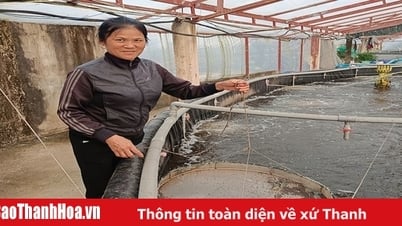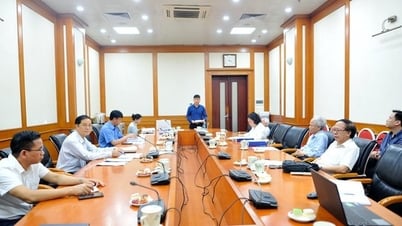Electronic invoice issuance activities at the store. (Photo: Hoang Ngoc/VNA)
From the mandatory requirement to use electronic invoices for business households with revenue of 1 billion VND or more, to the regulation to tighten the opening of indirect investment accounts, or changing the way of submitting reports to the State Securities Commission... all aim to make the market transparent, strengthen management and promote comprehensive digital transformation.
Below are the prominent economic policies that will take effect from June 2025.
Business households with revenue from 1 billion VND/year are required to use electronic invoices.
According to Decree No. 70/2025/ND-CP amending and supplementing a number of articles of Decree No. 123/2020/ND-CP regulating invoices and documents issued by the Government on March 20, 2025, effective from June 1, 2025, households and individuals doing business with revenue of 1 billion VND/year or more must use electronic invoices generated from cash registers connected to tax authorities.
This is an amended regulation from Decree 123/2020/ND-CP issued on October 19, 2020 to increase transparency and more effective management of budget revenue.
The new policy not only applies to traditional businesses but also extends to areas such as food and beverage, hotels, passenger transport, entertainment...
Mandatory use of e-invoices will help reduce tax fraud and help authorities closely monitor business activities.
Invoices from cash registers do not require a digital signature but are still recognized as valid when declaring tax obligations. This is a step forward in the digital transformation of the tax industry, contributing to building a public, transparent and modern business environment.
State-owned enterprises apply new salary mechanism from June 15, 2025
Circular 003/2025/TT-BNV of the Ministry of Home Affairs issued on April 28, 2025 on guidelines for implementing labor, salary, remuneration and bonus management in state-owned enterprises takes effect from June 15, 2025.
The Circular provides detailed guidance on the mechanism for determining salaries, remuneration and bonuses at state-owned enterprises. Accordingly, salaries will be calculated based on pre-tax profits, labor productivity and return on equity.
For non-profit enterprises, the evaluation criteria will be total revenue minus total expenses, after excluding objective factors such as natural disasters, epidemics, etc. The Circular also requires enterprises to rebuild the salary scale and table system if it is not suitable.
Determining the salary fund will be done through clear methods such as average salary, stable unit price, or distribution according to specific targets.
The new policy aims to promote financial transparency, enhance management responsibility, while creating real motivation for workers, linking income to business performance and improving productivity of state-owned enterprises.
Each investor is only allowed to open one indirect investment account in Vietnam.
According to Circular 03/2025/TT-NHNN of the State Bank of Vietnam issued on April 29, 2025, regulating the opening and use of Vietnamese Dong accounts to conduct foreign indirect investment activities in Vietnam, effective from June 16, 2025, foreign investors are only allowed to open one indirect investment account in Vietnamese Dong at a single bank to conduct related transactions.
This is an important step to more closely manage foreign investment flows and prevent fraud and money laundering.
In some special cases, foreign securities companies can open 2 accounts if they have 2 securities trading codes issued. International financial institutions or foreign government organizations also have exceptions but must provide full documents proving valid securities trading codes.
Unifying and limiting accounts helps regulators easily monitor cash flows and increase transparency in the stock market, especially in the context of Vietnam strongly attracting international investment capital.
Reporting to the State Securities Commission must be done entirely electronically.
Circular 20/2025/TT-BTC of the Ministry of Finance issued on May 5, 2025 amending and supplementing a number of articles of Circular 51/2021/TT-BTC dated June 30, 2021 of the Minister of Finance guiding the obligations of organizations and individuals in foreign investment activities in the Vietnamese securities market, effective from June 20, 2025. The Circular stipulates that all organizations and individuals involved in foreign investment activities in the Vietnamese securities market must submit reports electronically through the State Securities Commission's foreign investor management system. Report documents must be stored for at least 5 years.
In case of force majeure such as network or system errors, inability to use digital certificates... the reporting organization must submit a paper copy with an electronic data file and notify the State Securities Commission of the reason. As soon as the system is back in operation, the electronic reporting obligation must be completed.
This policy aims to modernize the reporting process, reduce administrative burden and increase accuracy, while also being in line with the strong digitalization trend in financial market management today. This is an important step in improving the effectiveness of management agencies' supervision of foreign investors' activities.../.
According to VNA
Source: https://baothanhhoa.vn/ho-kinh-doanh-co-doanh-thu-tu-1-ty-dong-moi-nam-bat-buoc-dung-hoa-don-e-dien-tu-250424.htm

































































































Comment (0)